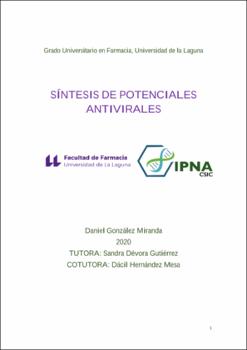Síntesis de potenciales antivirales.
Author
González Miranda, DanielDate
2020Abstract
The appearance of antimicrobial resistances and the emergence of unknown viruses and bacteria is one of the major health problems globally. Therefore, the research and development of possible new treatments is considered essential.
In the search for new antimicrobial drugs, N-azanucleosides are a very promising family of compounds. In fact, many of them have displayed promising bioactivities, by inhibiting key viral and bacterial enzymes. In order to advance in these studies, it is necessary to have simple, direct and inexpensive synthetic routes that readily provide
important collections of compounds for biological screenings.
This work uses a recently developed methodology that enables the preparation of N-azanucleosides from commercial -amino acid derivatives. Through this synthetic route, a collection of six N-azanucleosides was prepared, starting from commercial Lproline and L-trans-hydroxyproline derivatives, for antiviral evaluation. In the process,
basic synthetic protocols in organic chemistry were used, the compounds were purified by chromatography and characterized using mainly Nuclear Magnetic Resonance and mass spectrometry. Finally, a first screening of antiviral activity was performed to determine structure-activity relationships.





